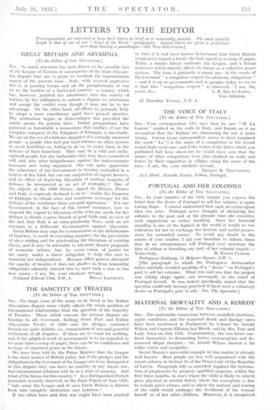THE SANCTITY OF TREATIES
[To the Editor of Tim SPECTATOR.] SiR,—No single issue of the many to be faced in the Italian Abyssinian dispute more vitally affects the whole problem of international relationships than the question of the Sanctity' of Treaties. Those which concern the present dispute are familiar to all—Covenant, Kellogg Peace Pact and Italian Abyssinian Treaty of 1928—and the pledges contained therein are quite definite, ice., renunciation of war and peaceful settlement of all disputes. If these are to count for nothing, and if the plighted word of governments is to be regarded as rio more than a scrap of paper, there can be no confidence and no hope of organized peace in the future.
We have been told by the Prime Minister that the League is the sheet anchor of British policy, but if the pledges and the obligations in the Covenant of the League are to be disregarded in this dispute they can have no sanctity in any future one, and international relations will be in a state of anarchy. And what of the future for this country ? As a distinguished French journalist recently observed, in the Paris Figaro of June 11th, " take away the League and at once Great Britain is thrown baok into complete abstention and isolation."
It has • often been said that war might have been averted
in 1914 if it had been known beforehand that Great Britain could never regard a treaty she had signed as a scrap of paper. Today a similar threat confronts the League, and a threat moreover which directly affects its future as a collective peace system. The issue is primarily a moral one—in the words of the Covenant " a scrupulous respect for all treaty obligations " —and it is up to governments and to peoples today to see to it that this " scrupulous respect " is observed.--I am, Sir,
ViCe-Admiral.
42 Hamilton Terrace, 8.





































 Previous page
Previous page